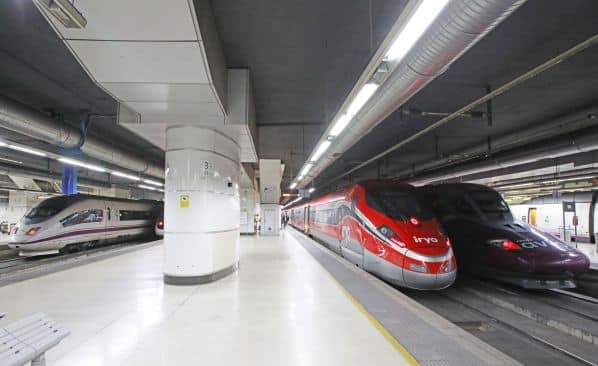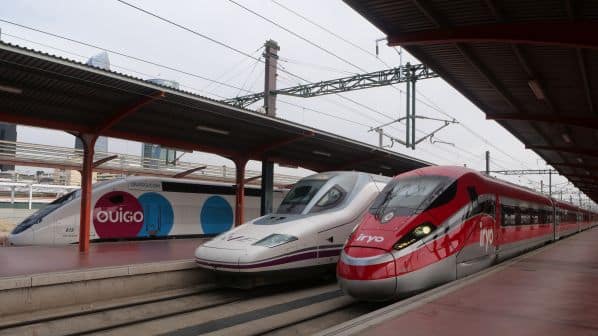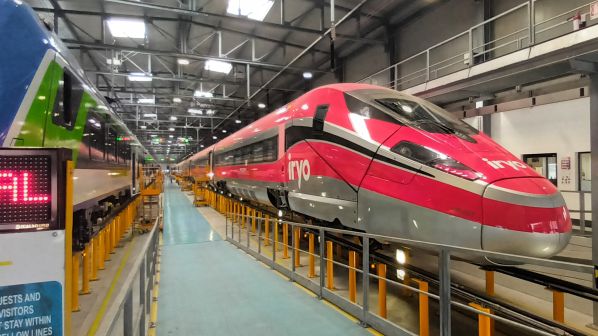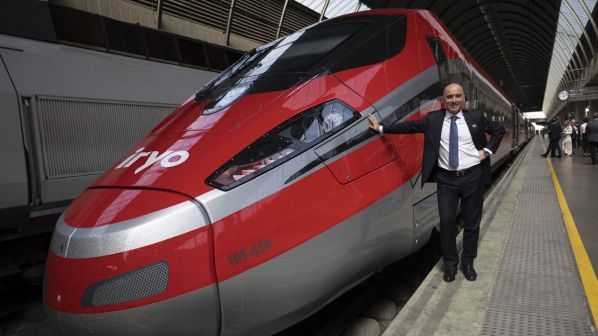SPAIN’s National Markets and Competition Commission (CNMC) has published data showing that passenger numbers on competitively-operated high-speed routes in Spain increased by a third to more than 8.4 million passengers in the third quarter of 2023, with some routes showing growth of more than 90% during the quarter.
Spain’s three high-speed train operators, Renfe Viajeros, which operates AVE and low-cost Avlo services, Ilsa’s Iryo service, and French National Railways’ (SNCF) low-cost Ouigo service, have significantly expanded their activities in 2023, with additional services and routes set to be added in 2024.
The strongest year-on-year growth of 96% or 1.4 million passengers was recorded on the Madrid - Valencia route. All three operators have competed here since December 2022.
Passenger ridership increased by 66% on the Madrid - Alicante corridor to reach almost 1 million passengers. Competition on this route was introduced in the third quarter of 2023 after Ouigo launched its service in May followed by Iryo in June.
On the more established Madrid - Barcelona and Madrid - Seville corridors, passenger numbers fell in the third quarter, largely reflecting normal trends where greater numbers of passengers use high-speed services during the second quarter of the year. However, the 10% drop in passengers on Madrid - Barcelona services and 8% on Madrid - Seville were lower than in previous years.
CMNC analysis shows that Renfe Viajeros’ is the main operator on all corridors, with a share of 50-74% of passengers. Iryo gained more than 7% market share on the corridors to Andalusia, with 32% on the Madrid - Seville route and 26% on the Madrid - Málaga/Granada route. SNCF’s Ouigo does not currently serve Andalusia.
Productivity down
CNMC’s report states that while passenger numbers have risen overall, train occupancy and utilisation - key commercial indicators - have fallen. This is not surprising as the operators have added capacity, which is ahead of demand. It also reflects efforts by the operators to provide a comprehensive timetable offer in order to gain passengers and license conditions imposed by infrastructure manager Adif AV, which stipulates that each licensed operator must operate a minimum numbers of trains per day on each route.
Adif AV is planning to invite operators to expand competition to routes north of Madrid in addition to the several routes south of the capital, which are already competitively operated.
CNMC has also begun publishing passenger data online in what it describes as an open and reusable format. These figures indicate the levels of usage by operator, including how many seats are provided and how many were sold, and show significant variations in occupancy rates between routes and operators.
Fares fall
Fares paid by passengers have fallen, especially on routes where competition has been introduced during 2023. Iryo’s entry on the Madrid - Seville and Madrid - Málaga routes resulted in a 24% and 19% decrease in prices respectively, or at least €10 for all passengers, compared with the previous quarter, according to fare data collected by CNMC.
On the Madrid - Barcelona route, Iryo, Ouigo and Avlo offered average prices of around €40 while the cost of a ticket on AVE services averaged €60, down from €80 a year ago. On the Madrid - Valencia route, the average cost of an Iryo, Ouigo or Avlo ticket was around €22; on the Madrid - Alicante route it was €25-30. In both cases AVE services command a premium of between €10-15. Overall fares vary considerably between operators, with some very cheap tickets available for advance purchase, especially outside peak travel times.
CNMC says its analysis shows that on the routes where competition started earlier, the revenue per passenger-km - a measure that enables a comparison of routes of different lengths - is lower. For example, €0.0661 on Madrid - Barcelona and €0.073 on Madrid - Valencia. Prior to liberalisation, Renfe Viajeros was reporting €0.11-0.13 on both routes. On Madrid - Alicante revenue per passenger-km is less than €0.08, a drop of around 30% compared with pre-competitive operation.
The growth in high-speed passenger numbers has occurred despite use of regional and commuter trains being largely free of charge during 2023 thanks to government funded anti- inflation programmes.
These services are operated exclusively by Renfe Viajeros and have seen considerable passenger growth: by around 76% on conventional medium distance services, 40% on Avant high-speed medium-distance trains, which usually operate on high-speed infrastructure albeit for shorter journeys, and 21% in Cercanías suburban services in major cities.




